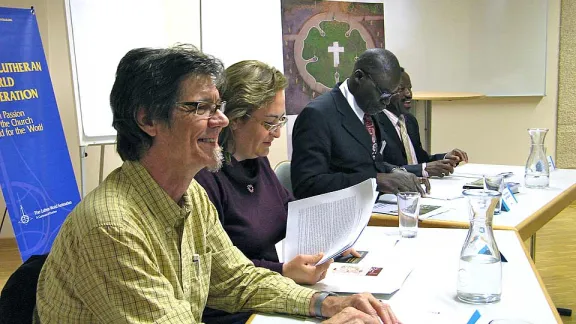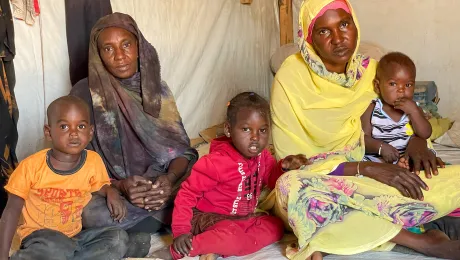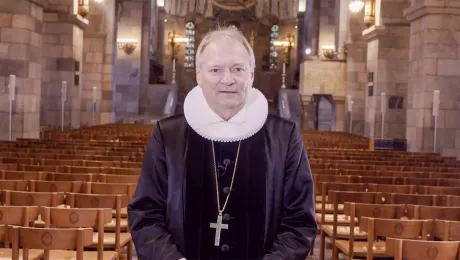
(left to right) Panelists Rev. Dr Vitor Westhelle (Brazil), Angela Trejo (Mexico) and Rev. Dr Peter Amana Bartimawus (Nigeria) together with moderator Bishop Dr Ndanganeni Petrus Phaswana (South Africa) at the Wittenberg consultation Lutheran theological education. © LWF/Anli Serfontein
Mission and Development Director Elaborates Outcome of Global Consultation
Renewing theological education and formation that responds to and gives meaning in an ever-changing society is an urgent task for The Lutheran World Federation (LWF), says Rev. Dr P. Filibus Musa, director of the LWF Department for Mission and Development.
“The LWF is calling on its member churches and theological institutions to renew theological education that goes back to the roots of the Reformation, yet addresses today’s issues,” Musa told Lutheran World Information (LWI), following a global consultation on theological education in Wittenberg, Germany.
He reflected on the outcome of the 18-22 October LWF international gathering, jointly organized by DMD and the Department for Theology and Public Witness, and hosted by the LWF German National Committee and the Evangelical Church in Central Germany. Participants including theologians and church leaders from around the world, and seminary and university educators also deliberated on ways of strengthening the Lutheran identity, and identified themes to pursue and focus on for the 500th Reformation anniversary in 2017.
The DMD director said the consultation sent out a strong message to theological institutions. “There is an urgent need for theological institutions to look at their curricula and examine how they inspire churches in renewal. There must be a direct correlation between theological education and formation at the institutions themselves and what happens on the ground in the congregations.”
There was a rich diversity of discussions at Wittenberg, Musa said. “It became evident that theological education was being challenged to become concrete and not abstract or out of touch with the people.”
Equipping Pastors
He underlined the training of lay leaders as a priority for theological institutions and the churches. “Theological education and formation should also equip pastors to take an active role in their communities and to exercise their prophetic role, to be a credible voice in society and to speak out for a just world,” he added.
Public theology and the role of church leaders in advocating for just societies was discussed and the delegates felt that public engagement gives the Church the chance to offer Christian insights and also learn from the public domain, but without losing the very identity of being church.
“The church should neither abandon nor turn its back against the public space. Therefore theological education should aim at enabling students to face the social and spiritual reality in their respective contexts. And their formation should encourage pastors to become prophets who denounce injustice and pain,” Musa explained.
The consultation agreed on four practical steps to move forward:
- set up regional and global networks to share experiences and resources
- build relationships between teachers/educators and the church leadership
- establish a forum to facilitate meaningful dialogue and exchange between theological institutions and congregations
- maintain an interactive directory for theological resources and volunteers to facilitate faculty and student exchange.
Strengthening and expanding the women’s theological network was seen as a priority at the five-day consultation. The need to facilitate and promote the influence of such networks in the LWF regions was emphasized.
Participants at the consultation shared a common worship life including devotion, Bible studies and prayers. On Sunday, 21 October, they attended a church service in the Castle Church where Martin Luther on 31 October 1517 nailed his 95 theses against the door, considered as the catalyst for the Protestant Reformation.
On Sunday afternoon LWF General Secretary Rev. Martin Junge and the LWF Vice-President for Central Western Europe, Württemberg Bishop Frank O. July, led participants in a tree-planting ceremony at the Luther Garden.
(Berlin-based journalist Anli Serfontein interviewed LWF/DMD Director Rev. Dr P. Filibus Musa.)


